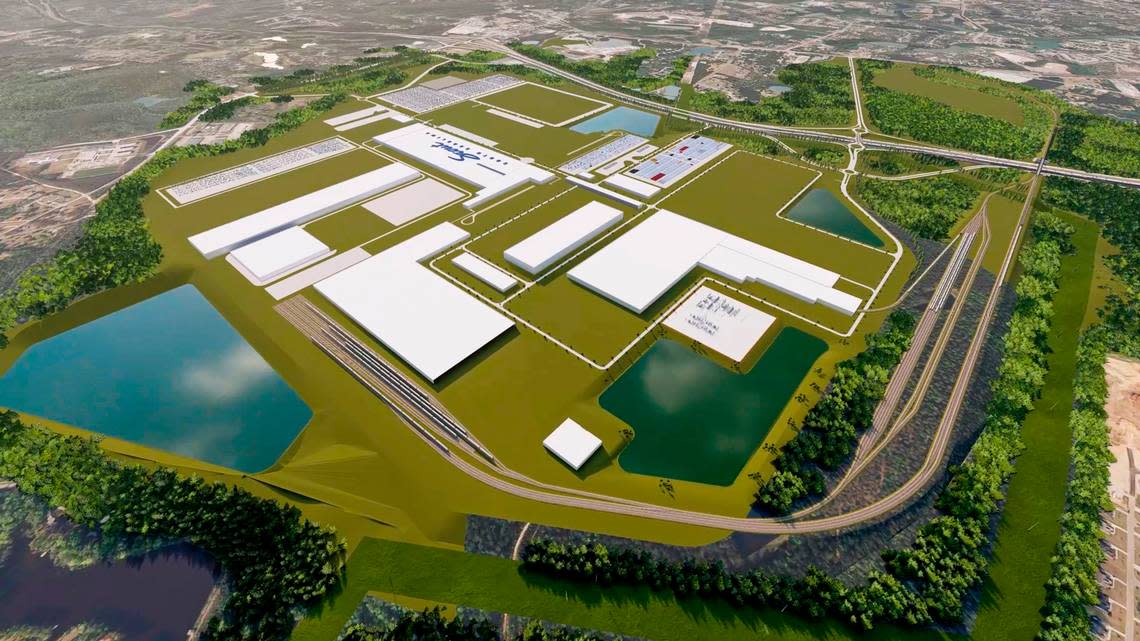Work paused at Scout Motors site amid environmental concerns

Scout Motors has paused work at the Blythewood site where it will build a $2 billion electric vehicle plant amid ongoing concerns from environmental groups and state and federal agencies.
“Construction work at the Scout Motors site is not ending; this is a pause in activity while permitting moves forward, including the period for public comment,” Richland County Economic Development Director Jeff Ruble and South Carolina Secretary of Commerce Harry Lightsey said in a joint statement shared Wednesday.
“As we look forward to the opportunities Scout Motors’ tremendous investment will bring, we value the people who call Blythewood home and want to make sure they stay informed about the project’s progress – especially as construction efforts will ebb and flow until completion,” the statement added.
The county and state Department of Commerce provided few details about the work stoppage beyond what was in the joint statement, so it was not clear if concerns by government agencies about wetlands rules violations were directly related to the decision to pause work.
But the state and county conceded they are halting site clearing activities while the process to obtain a wetlands permit continues, officials said.
The project can’t be completed without a wetlands filling permit from the U.S. Army Corps of Engineers. Construction work is not supposed to be done in federally protected wetlands until a permit is issued.
Contractors had started working to clear rocks and timber from the future site of the auto plant, but that initial work raised the eyebrows of environmental agencies.
The U.S. Environmental Protection Agency reported finding evidence that a creek was being filled before the government authorized the work. The South Carolina Department of Natural Resources said clearing and grading occurred before the agency could fully study the Blythewood property.
The Department of Natural Resources in July urged the U.S. Army Corps of Engineers to hold off on issuing the project a needed permit because of concerns the project was violating environmental rules. The concerns, which the Corps is looking into, were reported by The State in August.
A source familiar with the project said it would not be unusual for the Corps of Engineers to ask for a voluntary work stoppage while wetlands issues are resolved. A formal Corps order to halt work is seen as a last resort, the source said.
Glenn Jeffries, a spokeswoman for the Corps of Engineers, was not immediately available Wednesday afternoon.
Chad Johnston, a lawyer for the state Department of Commerce and Richland County, previously told The State that wetlands had not been filled and that the problem identified by the EPA was additional rock being put down as part of work on a culvert and road at a stream.
Now, work at the site is on hold while environmental concerns are looked at.
Environmentalists, who like the idea of building a plant that produces non-polluting electric vehicles, have said they are nonetheless concerned about wetlands impacts. They expected the Scout Motors plant being built on a roughly 1,600-acre site north of Columbia to affect the surrounding ecology.
”We anticipate the project will have significant impacts to wetlands and streams,’’ Congaree Riverkeeper Bill Stangler said Wednesday. His organization monitors and advocates for the health of Midlands waterways.
Wetlands are important because they provide habitat for fish and wildlife, soak up stormwater to limit flooding, and filter tainted runoff.
In June, Scout offered a first look at what those impacts would include. To construct its $2 billion manufacturing plant, Scout will damage or otherwise impact nearly 74 acres of wetlands, 38 acres of ponds and about 7 miles of creeks, according to details published by the Army Corps of Engineers in June.
To make up for the damage, the company is promising to protect, restore and make public 4,902 acres bordering the Congaree River and within the Congaree/Wateree/Upper Santee rivers basin, which also contains Congaree National Park, among other provisions.
This trade-off is a federal requirement when a project impacts wetlands, and the U.S. Army Corps of Engineers must approve a permit affirming the requirements have been met before certain work can begin.
The S.C. Department of Commerce and Richland County applied for the permit in early June.
State leaders have touted the Scout Motors project as historic for the state and the Midlands. In the first phase of the project, the automaker plans to construct six buildings totaling 3.1 million square feet. Other phases would include 25 more buildings totaling nearly 13 million square feet. As many as 4,000 jobs could be created, with Scout expecting to manufacture 200,000 vehicles each year, state officials have said.
Later this month, Scout Motors is hosting a series of presentations to show residents a 3D model of the auto plant, on Sept. 17 and 18 at Blythewood’s Doko Manor.
State agencies will then hold their own informational session at Doko Manor Sept. 19, 4-7 p.m.

